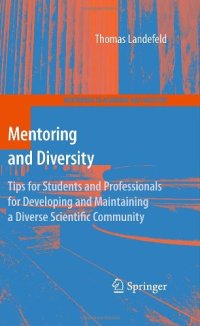
Ebook: Mentoring and Diversity: Tips for Students and Professionals for Developing and Maintaining a Diverse Scientific Community
Author: Thomas Landefeld (auth.)
- Genre: Biology
- Tags: Science general, Life Sciences general, Education (general), Biomedicine general, Learning & Instruction
- Series: Mentoring in Academia and Industry 4
- Year: 2010
- Publisher: Springer-Verlag New York
- Edition: 1
- Language: English
- pdf
Mentoring has always been an important factor in life and particularly in academia. In fact, making choices about educational pursuits and subsequent careers without input from mentors can prove disastrous. Fortunately many individuals have "natural" mentors and for them these choices are greatly facilitated. Others are not privileged with natural mentors and as such often struggle with making these tough choices. Many times these individuals are from under served and disadvantaged backgrounds, where mentors are too few and far between. For them, deciding on which career path to take can be based not only on insufficient information but oft times inaccurate information. Although the tips in this monograph are designed for helping all individuals who are interested in pursuing the study of science and science careers, a special mentoring focus is on those students who have not experienced the advantages of the privileged class. Additionally, tips are included for those who are interested in effectively mentoring these individuals. How and why a person gets to that point of wanting to mentor is not as important as the fact that they have made that commitment and this monograph will help them do exactly that.
This book will provide basic guidelines for facilitating the educational advancement of under represented students in the sciences, not only from the student perspective but also from the perspective of faculty advisors/mentors. Although the proper mentoring and advising of students about careers and preparation for the education and training associated with them is one of the most important components of a student's education process, this aspect has been severely lacking in academia in the past as well as the present. This is particularly the case with under represented ethnic minorities, despite the fact that mentoring of minority students has been identified as probably the most effective means for assisting them in achieving success. There are a multitude of reasons for this deficiency, including not enough mentors, students not “reaching out”, lack of resources as well as other societal and academic limitations. This book provides tips to help guide a student on choosing mentors, what to expect from mentoring, and effectively developing a strong personal portfolio. Tips are also provided to scientists and faculty on being an effective mentor. The emphasis of the book will be primarily on students of color in the sciences, who are severely under represented, and will be presented in a “guidebook” format to simplify the process as much as possible.